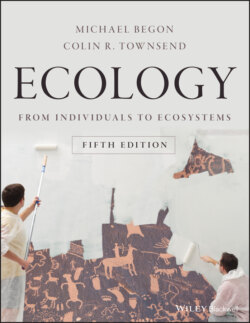Читать книгу Ecology - Michael Begon - Страница 136
5.6.6 Stochastic models
ОглавлениеThe models described so far have all been ‘deterministic’ models, that is, once the parameter values of the model have been specified (for example, Equation 5.7 with Nt = 10, R = 1.1) the outcome is definite, or ‘determined’. Whenever that model is run with those values, the outcome is the same: after one time step, for example, there will be 11 individuals in the population. But the real world is not like that. The most that we could say of any population would be that, over each time step, there is a certain probability that there will be no births, a probability that there will be one birth, a probability that there will be no deaths, and so on – such that typically, or on average, 10 individuals will become 11 individuals over the course of a time step. The actual outcome, though, would reflect the consequences of those probabilities playing out: sometimes 11 individuals, but sometimes 10, or 12, or more rarely 9, or 13, etc. Stochastic population models incorporate these probabilistic processes. They are therefore more realistic, but also more unwieldy, more difficult to analyse, and for the non‐specialist, more difficult to understand. Along related lines, individual‐based models deal with these stochastic processes by explicitly acknowledging each individual in a population and giving those individuals their own chances of being born, dying, and in more complex models, moving or growing, and so on (Black & McKane, 2012).
We deal mostly with deterministic models throughout this book – because of their relative simplicity, and because for larger populations, the dynamics of deterministic and stochastic (or individual‐based) models are hard to distinguish. Note, nonetheless, that for smaller populations, those models can behave very differently. Figure 5.24a, for example, shows a population reflecting a deterministic model like that in Equation 5.12, with an initial size of 3 and a carrying capacity of 25, and therefore exhibiting S‐shaped growth as we saw in Figure 5.20a. Figure 5.24a also shows, however, three runs of an equivalent stochastic model. Two of those follow a similar path to their deterministic counterpart, albeit a more irregular one. But the third, far from approaching its notional carrying capacity, falls to extinction. The population, putting it colloquially, had a run of bad luck, but of course, such things do happen, whereas the population in the deterministic model is incapable of going extinct, or indeed of doing anything other than approaching its carrying capacity smoothly, and staying there.
Figure 5.24 Populations in stochastic models may have a high chance of going extinct even when their deterministic counterparts are incapable of doing so. (a) The smooth line is the output of a deterministic model of population growth regulated by intraspecific competition, initiated with a population size of 3 and with a carrying capacity of 25. The irregular lines are outputs of three runs of an equivalent stochastic model. (b) The variance in the number of individuals in the next generation as a function of the number in the current generation – an established proxy for the estimated time to population extinction – for various stochastic models of population growth regulated by intraspecific competition, as indicated. D has stochastic birth and death only. DE and DEH also have environmental stochasticity. DH and DEH also have individual heterogeneity in birth and death probabilities. The vertical dashed line marks the carrying capacity, 20. The greater the variance, the shorter the expected time to extinction.
Source: (a) After Allen & Allen (2003). (b) After Melbourne & Hastings (2008).
stochastic models of population extinction
These differences between the dynamics of deterministic and stochastic models are arguably most important when we are focused on small populations that we wish to conserve (reviewed by Ovaskainen & Meerson (2010)). Deterministic models of regulated population growth, taken at face value, would tell us that a population was safe from extinction, however small it was, as long as it had a finite carrying capacity and positive value of R. Believing this would be dangerously complacent. By contrast, stochastic models, going back to early studies (e.g. Leigh, 1981) have estimated expected times to extinction and found these to increase exponentially with carrying capacity. This reflects the reality than even in a world of stochastic birth and death rates, large populations have a negligible chance of going extinct, but for small populations, extinction within a given time window may be close to inevitable. Moreover, if we relax the assumption that the environment itself is stable, and acknowledge instead that there is likely also to be environmental stochasticity as well as, for example, heterogeneity amongst individuals in their birth and death probabilities, then these further compound the effects of demographic stochasticity, greatly reducing the expected times to extinction (Figure 5.24b). We deal more fully with the conservation of small populations in Section 15.4.2, but it is clear that in order to judge the threats that they face, we shall often need to acknowledge all of the stochasticities affecting them, and to incorporate these into models that are themselves stochastic.
